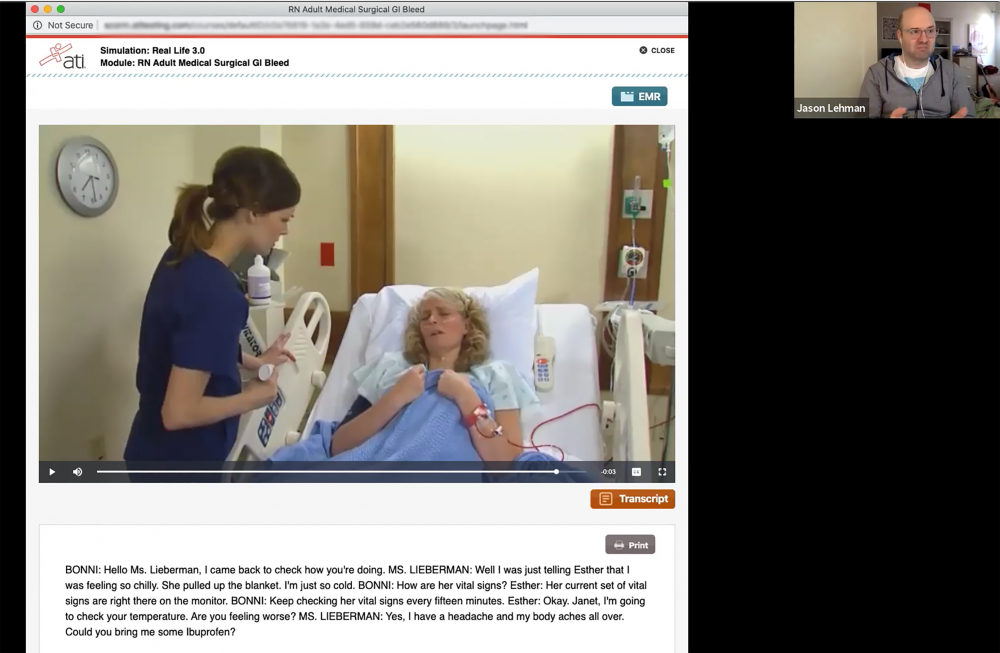This content was published: May 11, 2020. Phone numbers, email addresses, and other information may have changed.
Heeding the Call: Nursing Program pivots to find a way to graduation for students
Photos and story by Sarah Rose Evans
As Portland Community College’s Nursing Program Director, Heather Reynolds ensures that both students and faculty have the tools and support they need to be successful. When COVID-19 (coronavirus) forced the program to move entirely online, her job became a bit more challenging.
“My responsibility is to care for them, keep them safe and deliver on our mission to provide high-quality nursing education,” Reynolds explained. “We transform individuals into caring nurses, who meet the evolving health needs of our community.”
When the pandemic hit, she knew that education would be especially critical. She worked with faculty to quickly pivot and develop remote delivery so that students could complete spring term and graduate on time. Class content is posted on D2L in recorded sessions where students can view asynchronously, on discussion boards, and in live virtual meetings during regularly scheduled course times.
COVID-19 Resources
- PCC has moved to virtual operations and online/remote classes. The college has put together resources for students and staff related to the college providing online classes and services.
Rather than attending clinical experiences to practice direct patient care, students engage in virtual simulations, including the “ATI Real Life Clinical Reasoning” scenarios, which were approved by the Oregon State Board of Nursing. These scenarios were used in the National Council of State Boards of Nursing study, which concluded that simulation can be effectively substituted for up to 50 percent of traditional clinical experience.
“This will be different learning, but it will be no less valuable,” Reynolds said. “There is great potential for students to experience learning they otherwise would not have.”
An unexpected benefit of students studying virtual scenarios with medical actors is that the nursing students get to make independent decisions in key patient care scenarios, like a “Choose Your own Adventure.” They get immediate feedback on their choices and are able to go back and see what would happen if they made different choices.
“Not all students get the opportunity to work with a patient experiencing chest pain, for example, so combining virtual scenarios with traditional clinical experiences may give students a breadth of experience they may not have otherwise gotten,” Reynolds commented. “The scenarios are really life-like and allow them to make independent decisions in a safe environment.”
Even before COVID-19, there was a high demand for nurses in Oregon. With the pandemic, the need for nurses is even greater.
“Graduating is really important to our students, who have been working towards this goal for many years,” Reynolds said. “In addition to the benefit to our communities, it is also a way to financial security for our students. With so many facing hardships right now, it is critical for our students to be able to finish.”
In addition, for graduates to be able to join the workforce, they must pass the NCLEX-RN exam, a rigorous text examining of medical, surgical, pediatric, psychiatric and obstetric knowledge. To help the 28 financially vulnerable students cover the $435 fee for the exam and licensure, the PCC Foundation recently secured a $12,000 grant from the Zidell Family Foundation, which has been a longtime supporter of the PCC Nursing Program.
For many students, earning their nursing degree has been a long-term goal, the realization of a life-long dream, and the way to a better life. With a family to support, student Lynn King is eager to join the workforce. He is thankful that PCC is supporting him to help make that happen.
“As an ‘older’ non-traditional student, surviving on a tight budget with a spouse and three young children, we didn’t have some of the resources I needed to learn remotely,” King said. “Our Director Heather Reynolds personally coordinated a solution to help my family keep going until graduation. I am truly grateful.
“Some might have pushed the pause button when faced with the challenges of moving online, but PCC’s Nursing faculty have created solutions to enormous clinical challenges and have kept graduating students on track and engaged without skipping a beat,” he added.
Likewise, Reynolds has been impressed and appreciative of how students have responded to the crisis. She said the patience and support they’ve shown each other, the program, the faculty and staff has been significant.
“This shift to remote education has only been possible because of the hard work and dedication of the faculty and staff,” Reynolds said. “They have done an incredible job, shifting our entire program in such a short time.”
